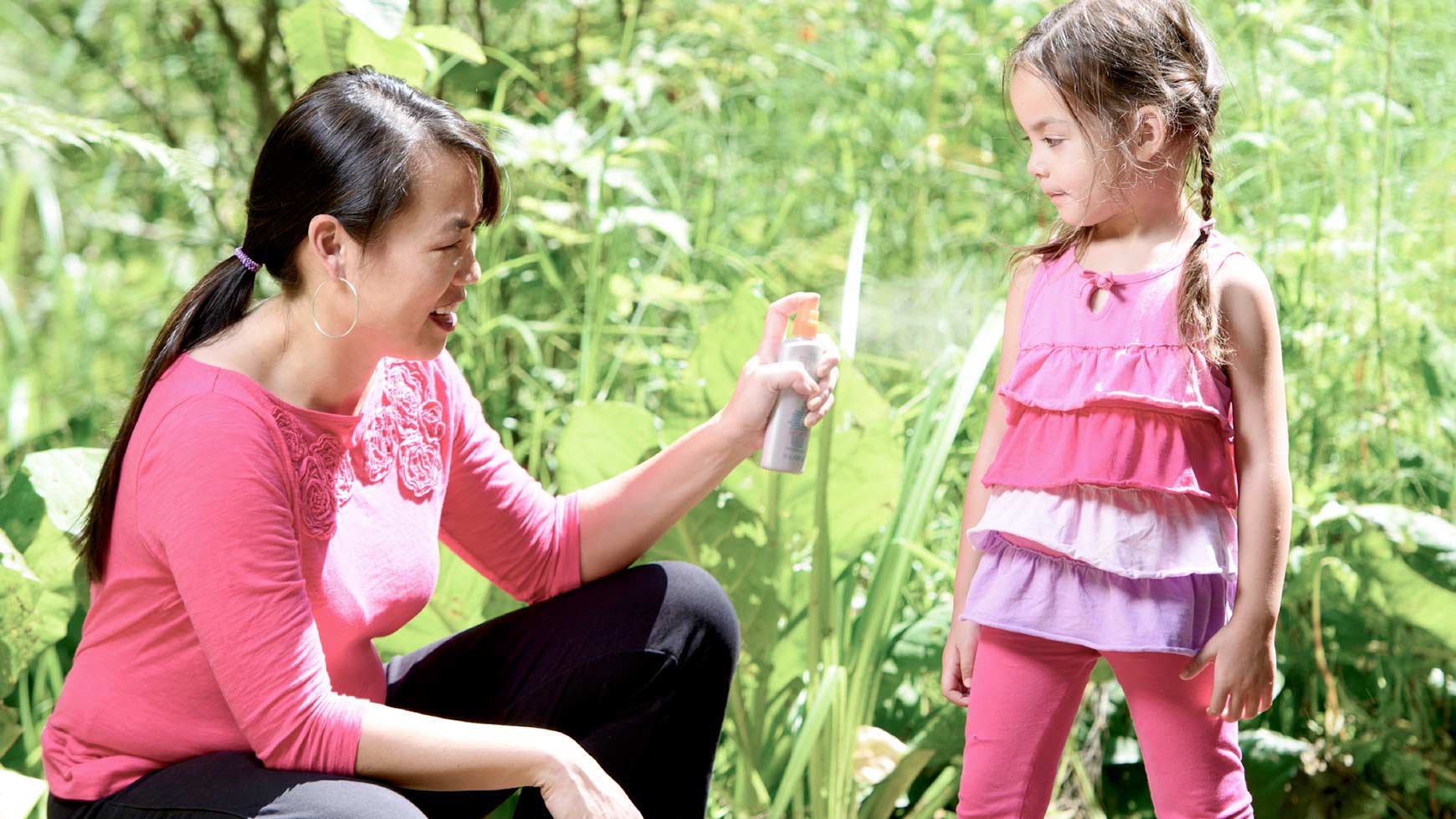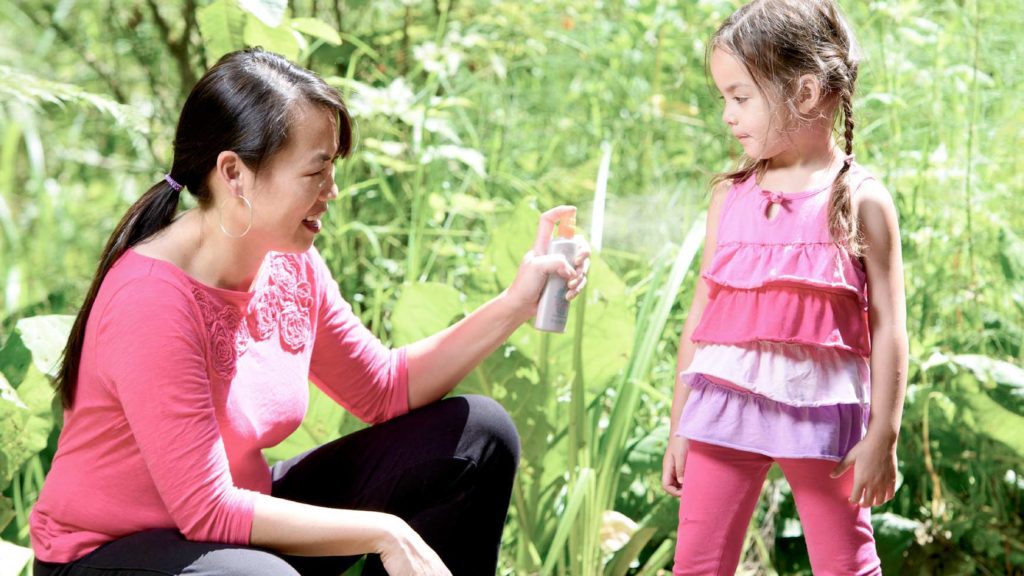It’s that time of year again, with warmer weather comes the return of Louisiana’s second state bird… the mosquito! In this installment of our Ask the Expert series, Dr. Mindy Calandro shares the best way to protect yourself and your kiddos from those pesky, Southern mosquitoes.
Parents Ultimate Guide to Insect Repellent for Kids
N,N dimethyl-m-toluamide (DEET)– This compound has been used as an insect repellent since the 1940s, and it is the insect repellent that is likely most widely known. DEET insect repellents may last anywhere from 2-8 hours depending on what percentage of DEET is contained in the products.
On average, products with 10% DEET will last about 2 hours while those closer to 30% DEET will last closer to 8 hours. There are products available with DEET concentrations higher than 30%, but studies show that these products do not provide any longer/additional protection.
DEET can protect against not only mosquitoes that transmit West Nile Virus and Zika virus but also against biting flies, gnats and ticks that can carry Lyme disease (although our ticks here in Louisiana do not carry Lyme disease).
Now, a quick Google search will produce results citing that DEET can cause neurologic issues namely seizures. This sure makes for good headlines, but the bottom line is that there have been 10 reported cases of seizures in children after applying DEET products to the skin in over 50 years!!
The Environmental Protection Agency (EPA) estimates that the risk of adverse reaction when DEET is appropriately used (i.e. applied only on the skin according to the recommended time intervals) is on the order of 1 per 100,000,000 people!

So what are the downsides to DEET? Well, if you have ever used a repellent containing DEET, you may recall a rather strong smell and a bit of a greasy feel. Also, DEET can cause skin irritation for those with particularly sensitive skin. Finally, DEET can cause damage to materials such as plastics, rubber, or leather so make sure to wash your hands prior to touching things like eyeglass frames, golf clubs or certain water bottles.
Recommendation for use: DEET 30% or less is ok for children 2 months of age and older.
Common Insect Repellent with DEET: Off! Familycare and Deep Woods, Cutter Skinsations and All Family, Repel Family
Picaridin– This product was approved by the Center for Disease Control for use as an insect repellent in April 2005 although it has been used for many years prior to this in other countries. Picaridin is created from the extract of the leaves from the pepper plant and has really no odor, does not damage plastics, and has less risk of skin irritation when compared to DEET products.
Picaridin products are available in strengths from 5-20% with approximately 3-5 hours of protection with a 10% formulation. Studies show that Picaridin can protect people from many of the same biting insects that DEET protects from including those pesky mosquitos that carry West Nile and Zika virus.
So what is the downside to Picaridin? Since it is a relatively new product approved by the CDC and EPA, there are not as many long-term studies available here in the US. However, based on what we know of this compound as well as reviewing many years of data from other countries on the use of Picaridin, it seems that Picaridin is likely a very safe and effective alternative to DEET.
Recommendations for use: 10% Picaridin lotions for children 2 months and older.
Common products with Picaridin: Avon Skin so Soft Bug Guard, Natrapel, Sawyer Picaridin
Oil of Lemon Eucalyptus– If we are talking about the CDC and EPA approved version of this compound, it is actually a chemically synthesized version of oil of lemon eucalyptus and not the “pure” oil. Most versions of this repellent you will find are concentrations of 30% and can provide about 2 hours of protection.
However, the data is still out on if oil of lemon eucalyptus can protect as well as DEET or picaridin against West Nile mosquitos. Another important thing to know about oil of lemon eucalyptus is that it should not be used on children under 3 years of age because of risk of skin irritation as well as significant eye irritation.
Recommendations for use: Only in children 3 and older, and I would consider it a distant 3rd to DEET and picaridin
Common products with Oil of Lemon Eucalyptus: Repel Lemon Eucalyptus, Off! Botanicals
Plant based oils: In this final category, we will group all essential oils but those referenced most commonly include soybean, lemongrass, citronella, peppermint, and lavender. It is important to realize that none of these oils have been approved by the EPA or CDC for efficacy in protecting against insects.
If these products do provide any protection from bug bites, and that is a big “if,” it is likely a very short window of less than 1 hour. Also, as with all essentials oils, I would use extreme caution with these products on children with sensitive skin.
Recommendations for use: In my mind, I would not use these as insect repellents.
Common products with plant-based oils: California Baby Natural Bug Blend, Babyganics Natural Insect Repellent
A few things to keep in mind no matter what type of insect repellent you choose:
- For young children, parents should use their hand to apply the repellent to children rather than spraying it on them. For those children who tend to put their hands in their mouth, do not put the repellent on the hands.
- Do not apply in close proximity to the eyes or mouth of children
- Do not apply to open cuts or wounds
- Products that are a combination of sunscreen AND insect repellent should not be used. Since sunscreen should be applied every 2 hours, this would lead to most insect repellents being applied far too frequently.
- When coming inside make sure to wipe/wash all insect repellent off prior to children getting into bed.
As you and your family are enjoying the last days of summer, and if you are like me, looking forward to the upcoming fall, realize that those pesky mosquitos will be hanging around for at least another few months.
Across the board for all of those 2 months of age and older, there may be many options out there when it comes to insect repellents, but I would recommend sticking with either a DEET or picaridin based product to provide the most protection for your loved ones.
“Ask the Experts” is a series on Baton Rouge Family Fun where local experts share their thoughts, and opinions and answer questions relating to health, wellness, parenting, and living in Baton Rouge.
Disclaimer: The purpose of this site is to share Baton Rouge Family Fun’s experiences with food, fitness, health, and life as well as opinions from some of our local experts. This content is for informational purposes only and isn’t a substitute for professional medical advice. When it comes to your health or the health of your child, please be sure to contact your physician.



